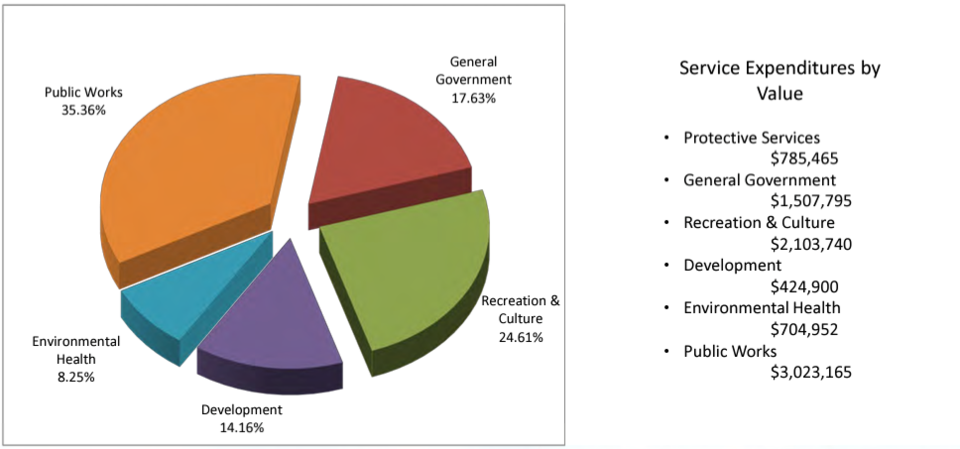Pay less, spend less – that’s the plan for this year’s City of Flin Flon budget and tax scheme.
The budget anticipates a sharp drop in money raised through municipal taxes, going from a forecast just over $10 million last year to around $9.4 million, as well as about a $600,000 decrease in “other revenue.”
The 2020 edition of the Flin Flon financial plan was released by city council at a public meeting March 3 at City Hall.
The City received $13,850,025 in total revenue last year. The target for municipal revenue has decreased to $12,584,636 this year - a drop of more than $1.25 million.
Spending is also down, with total expenditures forecasted at $12,584,574, just shy of the total forecasted sum of City revenue. That number is down from $13,947,934 last year, where the City showed a small deficit between spending and revenue.
Much of the reason for the decrease in revenue and spending is a new round of property assessments, which officials said showed decreased values across the city, along with changes in grants for protective services and the closure of the Flin Flon Aqua Centre.
“We’re looking at at least a million dollars in reduced revenue. That is related to the drop in assessments. There’s some small differences in taxes. It’s related to other revenue, which is reduced revenues in our grant funding. It’s about reduced revenues relating to the Aqua Centre as well, because with an Aqua Centre closure we have reduced expenses, but we also have reduced revenue,” said City treasurer Lyn Brown.
In total, those assessments have seen property values in Flin Flon drop by an average of 12 per cent.
“The other thing this year is that we’ve reduced our mill rate. If your home was valued at $50,000 based on assessed value, your taxes in 2020 will be $84 less. If your home was assessed at $200,000, your taxes in 2020 will be $374 less,” Brown said.
Total municipal mill rates have declined, going from 27.15 last year to 25.97 for both residential and commercial properties. Including school mill rates, which have increased from last year, the total mill rate for residential property owners will be 50.12 this year, with a mill rate of 59.89 present for commercial properties. The residential fee is similar to last year, while commercial fees will increase slightly.
Total revenue received by the City last year showed a modest increase from the original budget, with the City gaining $3.78 million in “other revenue” instead of the forecasted $3.58 million. That offset a decrease in expected funding from net municipal taxes and grants-in-lieu, which came in just shy of $10 million, about $50,000 short of original targets.
Spending
The area where the most money will be spent this year is in public works, where just over $3 million in total funding is slated. Recreation and culture will see $2.1 million, and just over $1.5 million will go to general government.
For capital expenditures, about $2.29 million is forecasted to be spent over this year. Most of the money will go to upgrades and renovations at the City’s public works maintenance shop - $600,000 in total. Money will also go to ongoing water and sewer utility upgrades ($533,400), upgrades to the Flin Flon Community Hall ($230,000) and Flin Flon Tourist Park ($170,000), repairs to the sewers and dressing rooms at the Whitney Forum ($185,000), funding to clean up and demolish the now-shuttered Flin Flon Aqua Centre ($237,500) and smaller projects.
The utility upgrades will be a continuation of the City’s ongoing water and sewer project, which began in earnest last summer.
“There is a bit of finishing to do on the project that can’t occur until it is warmer, as well as holdbacks to be paid out,” Brown said.
Overall spending has decreased from the City’s 2019 budget, including a drop in capital spending of about $1.87 million.
“We cut the budget by a million dollars – what more do you want us to do?” said councillor Tim Babcock.
A quarter of a million dollars will be spent on projects from the City’s capital reserve funds, including the purchase of a new Zamboni at the Whitney Forum ($140,000), the purchase of a pontoon boat for use in conjunction with Camp Whitney ($35,000) and a new skid steer ($75,000). Each year, the City’s equipment reserve is allocated $300,000 to purchase any necessary equipment.
Capital projects are determined through discussions with City managers, Brown said.
“As they are out in their various capacities, they see where the priority needs are in terms of infrastructure upgrades, etc. These are then added into the budget, which is first run by council before it is ready for public presentation,” said Brown.



